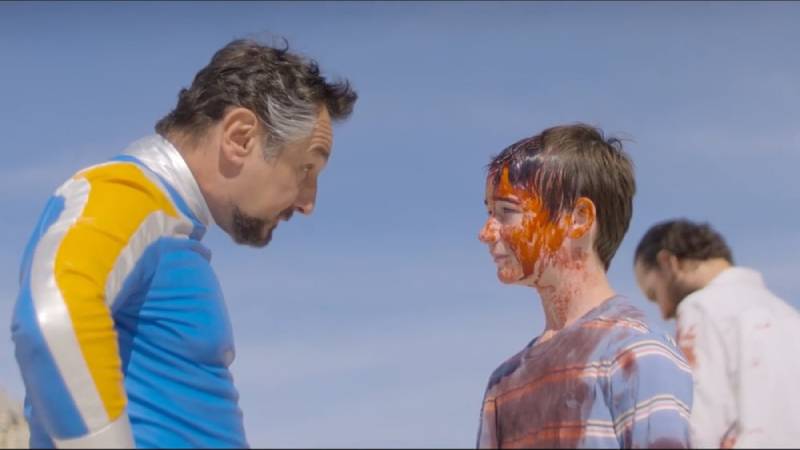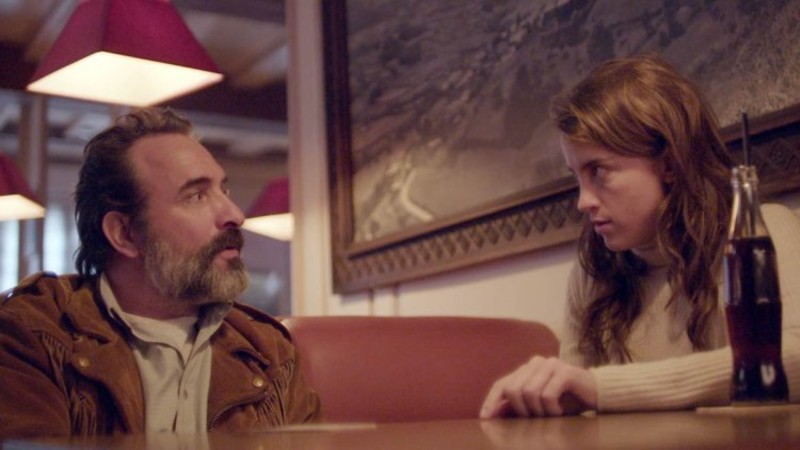QUICK AND DIRTY: LIVE FROM TALLINN
There are movies about art and artists. There are documentaries. And then there is Daaaaaali!!!! Whatever expectations one has of a Quentin Dupieux movie (2019’s Deerskin, 2022’s Smoking Causes Coughing, or 2023’s Yannick), this fulfils them. France’s comic auteur makes movies unlike anyone else, completely bonkers and very funny.
It doesn’t start off with celebrated surrealist artist Salvador Dali but with Judith (Anaïs Demoustier from Smoking Causes Coughing and Francois Ozon’s The New Girlfriend, 2014), 33, a former pharmacist who decided one day to become a journalist. In reality, it doesn’t start off with Judith but with a scenario that stages a Dali painting (Necrophilic Fountain Flowing from a Grand Piano, 1932). A piano in barren Spanish countryside with a tree-shaped, potted plant sitting on top and a continuous arc of water flowing from a hole in the side of the piano.
Judith is the first character we meet in the film. Now, here she is admitting all this to camera and interrupted by a PR turning up to inform her Dali is on the way to the hotel room for the interview. The PR tries to stop the interview going wrong by ensuring there is a plentiful supply of sparkling mineral water in the room (the artist guzzles it by the gallon), but it’s a disaster anyway because the journalist has no camera present. Dali will not do an interview without a movie camera, so he walks out.
Movie over.
Which, in a way, is the plot of the film. Daaaaaali! has more endings than any other film I can think of. Judith attempts to restart her interview, now a movie about Dali with cameras and crew, thanks to her editor / producer (Romain Duris from The New Girlfriend) several times. Dali, meanwhile, is invited for supper at his gardener Georges’ house where a priest recounts a dream up to the point where, “and then I woke up”. Perhaps we’re still in your dream, quips Dali at one point in the post-dream conversation, and sure enough, some time later, the priest again says, “and then I woke up”. It’s easy to lose count of the number of times this happened, easy to do when you get caught up in the other subplot, the one about Judith trying to restart her interview (movie) with Dali.
There are many movies like this, and usually it’s an irritating cliché indicative of lazy screenwriting (or possibly a writers’ strike). Not so here. It’s impossible to say whether Dupieux holds any regard for Dali as an artist, because the film is far more interested in Dali the showman, the actor, the persona, the diva, the narcissist, a character not unlike the self-obsessed jacket-seeker of Deerskin. Perhaps inevitably, when it comes to the end of the film, Dupieux has a lot of fun with that too, throwing a whole series of different endings (with a ‘Fin’ title card) at the audience before the film’s ending proper.
Rather than have one actor play the character, Dupieux has five (Gilles Lellouche, from Smoking Causes Coughing; Édouard Baer; Jonathan Cohen; Pio Marmaï from Yannick; and Didier Flamand who worked with Dali’s sometime filmmaking colleague Luis Buñuel on The Phantom Of Liberty, 1974). The whole endeavour is deeply surreal. Dupieux is fascinated by Surrealism, although in his case it’s not the type of aesthetic that critics describe as comic when it’s not actually very funny. Dupieux’s films are very funny indeed, and this one is no exception. As a bonus, its hilarity is bolstered no end by a repetitive, silly yet highly effective, acoustic guitar score by Thomas Bangalter, formerly of Daft Punk. The score is very close to being irritating, yet somehow achieves a near-impossible balancing act to take the humour to a whole other level.
A gem. It absolutely delivers everything you hope it would.
Daaaaaali! played out of competition at the Critics’ Picks Section of the 27th Tallinn Black Nights Film Festival (out of competition).










